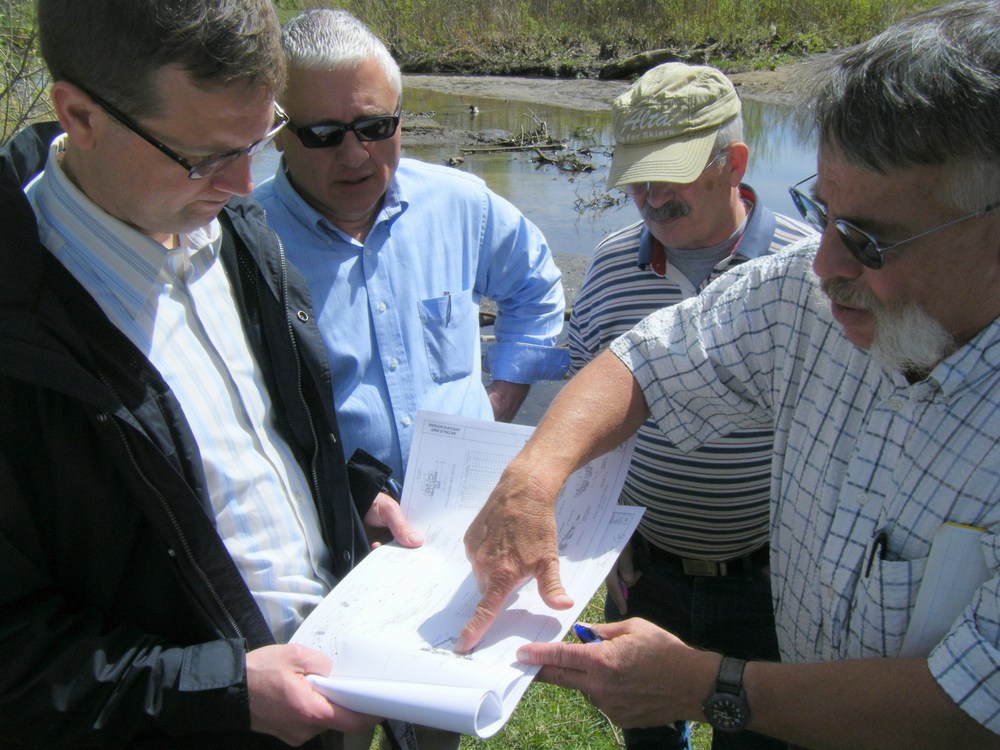AT PARKSVILLE 2019: Cross-border collaboration connects us with a larger body of experience! – Learn from Dave Derrick, stream restoration innovator, at a workshop on Sustainable Stream Restoration (on April 2) SPACE LIMITED
Note to Reader:
Join us in the City of Parksville on the east coast of mid-Vancouver Island for a field day on April 2, followed by a 2-day symposium on Water Stewardship in a Changing Climate on April 3rd and 4th. The daily symposium themes are Sustainable Stream Restoration and Restorative Land Development, respectively.
Learn from Dave Derrick. First, a classroom session. Then, an in-stream lecture at Shelly Creek, which is an emerging demonstration application for sustainable stream stabilization.
Dave Derrick specializes in environmentally compatible, cost-effective approaches and methodologies for design of river training structures, innovative construction methodologies for stream stabilization works, river and stream training structure inspection, monitoring, and performance analysis and physical movable-bed modeling.
Dave Derrick is the inventor and developer of many stream stabilization methods – for example Wrong Way Boil-Up Pools, Half Drowned Bushes, Grand Slams, Slit Trench Pole Planting and Hydraulic Cover Stones.
SPACE IS LIMITED (40 registrants maximum). CLICK ON THIS LINK TO REGISTER: https://www.civicinfo.bc.ca/event/2019/Parksville-Water-Stewardship-Symposium

Dave Derrick in action and teaching stream restoration
An Outdoor Classroom on Sustainable Stream Restoration at Shelly Creek (April 2, 2019)
 Dave Derrick had a 35-year career with the US Army Corps of Engineers where he held the position of Research Hydraulic Engineer in the Coastal and Hydraulics Lab.
Dave Derrick had a 35-year career with the US Army Corps of Engineers where he held the position of Research Hydraulic Engineer in the Coastal and Hydraulics Lab.
Dave has had the opportunity to model ideas in the lab and then implement solutions in the field. He developed and refined dozens of cost-effective streambank protection techniques, including different types of Bendway Weirs.
He enjoys working with community-based groups. His focus is on “using nature’s materials”. Through 150-plus workshops over the past decade, he has taught over 8,000 individuals.
Beyond the Stream Channel
In addition to his work in research and development, Dave Derrick is often called on as a technical consultant for complex projects involving diverse shareholders, including landowners, conservation groups, as well as local, county, state and federal agency personnel. He often acts as a facilitator to identify and combine shareholder’s skill sets and experience of this diverse assemblage of personnel, forming them into the required effective, interdisciplinary design team.
To Learn More:
Visit http://www.riverspace.com/resumes/dld/dld.html
for a synopsis of Dave Derrick’s career professional career as a fluvial geomorphologist.
Classroom Lecture in the Morning:
Improving Stream Function
 Dave Derrick was a co-developer and co-instructor in the first American Society of Civil Engineers stream class, titled An Introduction to Stream Investigation, Stabilization, and Restoration.
Dave Derrick was a co-developer and co-instructor in the first American Society of Civil Engineers stream class, titled An Introduction to Stream Investigation, Stabilization, and Restoration.
The morning lecture is a streamlined version of this course. Dave Derrick will cover the philosophy of restoration, channel dynamics and evolution, and bioengineering methods. Shelly Creek is the case study for improving in-stream hydraulic and environmental functions in fish-bearing streams along the east coast of Vancouver Island.
In the Field in the Afternoon:
Human Impact on Shelly Creek
Shelly Creek is an outdoor classroom for Dave Derrick to demonstrate how to assess stream stability problems and develop sustainable solutions in a ‘whole-system’ context.
When the Englishman River was declared to be the most endangered river in BC, the ‘call to action’ resulted in a Watershed Recovery Plan. Survival of Coho salmon depends on a healthy Shelly Creek, the key tributary.
Hydrology hits first and hardest. As a result, channel erosion and sedimentation caused by ‘changes in hydrology’ are threats to aquatic habitat and fish survival in Shelly Creek.
Shelly Creek is Parksville’s Last Fish-Bearing Creek
 In 1999 the Englishman River on the east coast of Vancouver Island was declared an endangered river. Extinction of the salmon resource was viewed as a very real possibility. This catalyst for action resulted in two transformational outcomes: implementation of the Englishman River Watershed Recovery Plan (2001); and creation of the Mid Vancouver Island Habitat Enhancement Society (MVIHES).
In 1999 the Englishman River on the east coast of Vancouver Island was declared an endangered river. Extinction of the salmon resource was viewed as a very real possibility. This catalyst for action resulted in two transformational outcomes: implementation of the Englishman River Watershed Recovery Plan (2001); and creation of the Mid Vancouver Island Habitat Enhancement Society (MVIHES).
Fast forward to the present. Shelly Creek, a tributary of the Englishman River that flows through the City of Parksville, is important to salmonids. MVIHES has established a provincial precedent with the Shelly Creek Water Balance & Sediment Reduction Plan; and this will have reverberations as the “Shelly Creek story” becomes well-known.
The Shelly Creek experience foreshadows that an informed stream stewardship sector may prove to be a difference-maker that accelerates implementation of the ‘whole-system, water balance’ approach in British Columbia.
To Learn More:

Dave Derrick explains stream restoration techniques on-site

